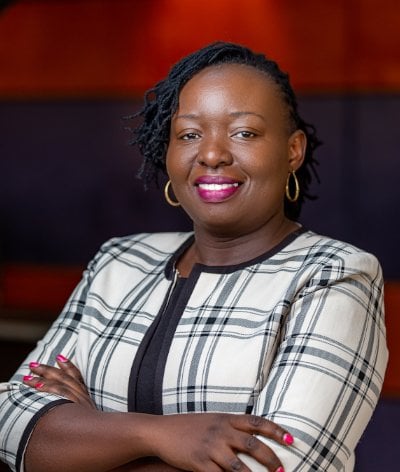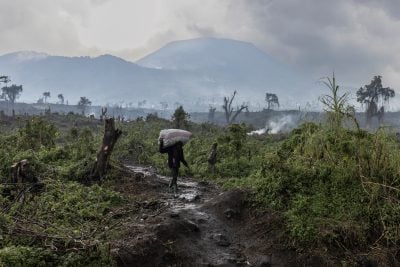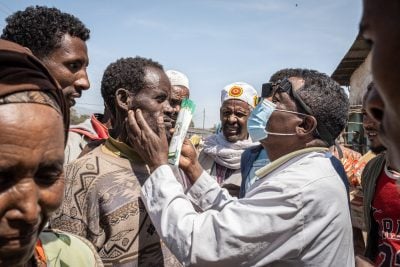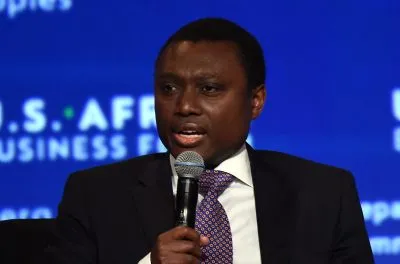Emma Mugisha, executive director and head of Business Banking at Stanbic Bank Uganda, believes that mobile money represents a huge growth market: after all, Uganda has more than 30m people using the payment method.
The pandemic has accelerated her bank’s agenda to partner with fintechs and other businesses to help them digitise the market. Stanbic has invested heavily in allowing customers to use USSD (Unstructured Supplementary Service Data) for mobile banking.
USSD is a global system for mobile communications protocol that is used to send text messages. It is a popular way to transact in many African countries, where many have phones but are without internet.
Mugisha says that USSD is a more popular digital channel in Uganda because not many Ugandans have smartphones and some prefer to use feature phones that employ the system.
As Uganda’s largest commercial bank by assets and branch network, Stanbic has played a critical role in the development of the country’s economy in recent years.
The South Africa-based Standard Bank Group established its presence in Uganda in the early nineties, but it transformed into the country’s main lender in February 2002, when it acquired 90% of the shares in Uganda Commercial Bank, a government-owned bank with 65 branches. It was renamed Stanbic Uganda Bank.
As Uganda’s economy continues to digitise, Stanbic has also moved into agency banking – where a fintech offers its customers a service, which is provided and managed by a bank that acts as the ‘agent’ of that service. Although Stanbic’s branch network is an important customer contact point, Mugisha says around 95% of her bank’s transactions are on alternative channels and out of branch.
“We find that our customers have moved more to digital channels as well as agent banking,” says Mugisha. “The agent bank is a very popular channel for our customers as well, especially for the smaller transactions, whereas the larger corporates are comfortable with internet banking.”
Lead arranger for MTN IPO
Last October, Stanbic was the lead arranger on MTN Uganda’s initial public offering, the biggest in the country’s history. The telecoms operator offered 4.5bn shares in Uganda’s relatively undeveloped capital markets.
Although the transaction was not as fully subscribed as the bank expected, Mugisha says the deal “shows us the depth of the market as well as the continuous education on the benefits of capital markets that we need to do to impart to the public as well as the existing market.”
Nevertheless, bringing such a large transaction to market was a “proud and important moment” for her, as the telecoms provider is one of the bank’s largest customers. The IPO allowed ordinary Ugandans to buy shares in MTN, thus opening the door for thousands of small investors who otherwise have little access to the bourses.
“To invest in the stock market, you had to go through the whole process, to get a broker and so on, but now, the market is on your phone and you obtain bite-sized [numbers of] shares; that makes the number of participants a lot wider. It was interesting at the time to see even security guards, teachers, all kinds of people actually buying shares in MTN,” she says.
Rwanda optimism
It is not just the telecoms sector that Mugisha believes will drive growth in Uganda’s economy in the years to come.
In February, Total and China National Offshore Oil Corporation (CNOOC) announced a $10bn investment in the Lake Albert project, which includes the development of oil fields, processing facilities and an electrically heated pipeline network.
Mugisha says it is a very significant project for Uganda, and believes it will drive economic growth over the next five years.
She adds that agriculture is the largest employer in Uganda at the moment, and that the sector will continue to grow.
“We are the food basket of our region,” she adds. “We may be landlocked, but we’re land-linked, as we sit in the middle of a huge hinterland of landlocked countries.”
All South Sudan’s imports usually go through Uganda; the eastern part of Congo is closer to Mombasa than it is to the Atlantic; and Rwanda’s trade also went through Uganda until there was a political rift between the two countries.
In January, Uganda and Rwanda re-opened their land border crossing after it had been closed for three years.
“We also have a lot of manufacturers in Uganda that sell agricultural produce into Rwanda as well,” she says.
Back to school
Education is a key sector for Stanbic, which has about 17,000 Ugandan schools among its clients. During the lockdown, the bank invested about $5m in education.
“More than 60% of our population are very young children. So, out of the 40m total population, you probably have 17m learners who were impacted for two years.”
The education sector also supports not only agriculture through schools purchasing food, but also a lot of micro-enterprises that depend on the sector.
Banks have been extending loans for school owners and giving them interest holidays, to help the institutions recover from the pandemic and improve their cashflows.
“Of course, you have sectors like tourism and other sectors that were impacted as well, but the educational system – because it meets the needs of so many Ugandans – was one that we decided to concentrate on as an economy to support,” she says.
Reaching Uganda’s farmers
In Uganda, around 40% of the adult population is unbanked. Telecoms companies like MTN are helping financial services deepen on the continent and for banks like Stanbic, this presents several challenges and opportunities.
“In the past, we’ve looked at salaried customers, or formal businesses, and with Uganda being a very informal market, we lost a big percentage of a potential customer base that we could probably have served.”
But reaching individuals in the informal market can be expensive. To be able to do this economically, the bank has set up a digital wallet called FlexiPay to support its ambitions to reach the last mile.
It has also been supporting Ugandan Savings and Credit Cooperative Societies (SACCOs), which are made up of small businesses, local banks and farmer co-operatives, through the Economic Enterprise Restart Fund (EERF).
Many Ugandans ate into their savings during the pandemic, so Stanbic supported them, partnering with several development organisations and providing cheaper funding for small businesses, while taking on additional risk, according to Mugisha. She says Stanbic has supplied around $25m in loans to SACCOs and the amount is growing.
“We would like to grow that fund to as large as $100m, if we can find as many participants as possible.”
The fund is focusing on three key areas, including cheaper financing, “so that the end user is able to retain some margin in their business and grow their business”.
The second is digitisation: “Tying that up with FlexiPay for the end user, we are also supporting the SACCOs to digitise. If they don’t have an Enterprise Resource Planning system, they partner up with three fintechs that can give them software to help them manage their business. That helps us to better appraise their credit-worthiness too.”
In partnership with the International Labour Organisation (ILO) and other employment-related organisations, Stanbic also provides training on the management of SACCOs and their members.
“So far we have digitised as well as trained close to 100 SACCOs. We’re also getting partners that are willing to give us grants that will help us to do this because otherwise it can get quite expensive.
We realised that once you have a good proposal, you’re not short of partners that can come in,” she says.
Stanbic also has another initiative to help the sector, called OneFarm, which aims to reach and support farmers through off-takers (businesses that buy farming produce) or agricultural processors.
For example, the bank is working on a project with Uganda Breweries for their barley producers as well as with grain traders at the Uganda Grain Council.
In a country like Uganda, where a significant proportion of the adult population is unbanked, Stanbic’s initiatives in the SACCO sector and elsewhere, promoting greater financial inclusion, can go a long way.
Want to continue reading? Subscribe today.
You've read all your free articles for this month! Subscribe now to enjoy full access to our content.
Digital Monthly
£8.00 / month
Receive full unlimited access to our articles, opinions, podcasts and more.
Digital Yearly
£70.00 / year
Our best value offer - save £26 and gain access to all of our digital content for an entire year!

 Sign in with Google
Sign in with Google 





